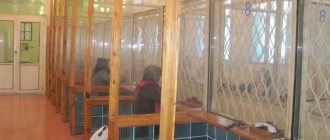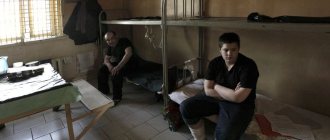A person in a pre-trial detention center has the right to meetings with a lawyer (without restrictions in number) and meetings with loved ones (twice a month). But an important condition is that before the meeting you must submit a request and obtain permission from the judge, investigator or head of the detention center.
The peculiarity of visits in a pre-trial detention center is that they can only be short-term, no more than 3 hours. This is regulated by Federal Law No. 103-FZ “On the detention of suspects and accused of committing crimes.” Are long-term ones allowed? Long meetings are permitted only after the verdict has been announced and the defendant has been transferred to a correctional colony.
Who are they allowed in?
Visits can be held from the first day of actual detention. Who is entitled to meetings according to the law? The following may come to the pre-trial detention center:
- lawyers handling the defendant's case;
- notaries to prepare documents necessary in court;
- family members of the prisoner and people who are not related to him by blood.
Attention . Unfortunately, there are common cases when people who are not relatives of the person being held in the pre-trial detention center (for example, colleagues or cohabitants who are not officially married) are not allowed to attend meetings. Please be aware that this is a direct violation of rights.
So how can you get to a meeting in a pre-trial detention center if you are not a relative? Article 18 of Federal Law No. 103-FZ “On the detention of suspects and accused of committing crimes” clearly states: “Suspects and accused, on the basis of the written permission of the person or body in charge of the criminal case, may be granted no more than two visits per month with relatives and other persons.”
Consequently, any refusal based only on the lack of confirmation of kinship can be appealed to a higher authority (through the Prosecutor General's Office, the Federal Penitentiary Service, etc.).
There is no law prohibiting meetings with minors . For example, a wife can take her young child on a visit with her detained husband (the situation is complicated only by the fact that for each visitor, including small ones, a request must be submitted separately).
Children and adolescents under 18 years of age are prohibited from visiting a pre-trial detention center alone; the presence of an accompanying adult is mandatory.
Queues, denials and threats: how lawyers work in a pre-trial detention center
It's hard to get to trustees
On Sunday, January 17, politician Alexei Navalny returned to Russia. Since that day, several of his supporters have been detained. During these days, the lawyers had a hard time. Under a variety of pretexts, they were not allowed into the police stations where the detainees were kept.
On January 21, lawyer Mansur Gilmanov came to the Moscow police department to see his client, Anti-Corruption Foundation lawyer Vladlen Los. There the defense lawyer was beaten by a policeman, then the lawyer was arrested for five days.
On January 23, Krasnodar lawyer Mikhail Benyash was arrested: the police and the court did not like the fact that he called on social networks to provide legal assistance to those detained at protest rallies.
Against the backdrop of protests in recent days, the Advokatskaya Ulitsa publication drew attention to another trend: sometimes lawyers were no longer allowed not only to the police department, but also to the courts. Moscow AP lawyer Mikhail Salkin was unable to get to his client in the Zyuzinsky District Court of Moscow. Another colleague of his, Maxim Pashkov, faced a similar problem in the Tagansky District Court of Moscow. While the bailiffs did not allow the defender to enter the checkpoint, his client was convicted. Some St. Petersburg lawyers found themselves in a similar situation.
Human rights activists and the legal profession have already responded to this problem: the Human Rights Council plans to appeal to the Ministry of Internal Affairs due to the massive refusal of lawyers to enter the police department, where those detained at protests were taken. And the Moscow AP announced “Research on the denial of access to principals to departments of the Ministry of Internal Affairs.” The FPA also contacted the Ministry of Internal Affairs: they complained to Minister Vladimir Kolokoltsev about numerous violations of the rights of lawyers and called on the department to dialogue.
In a word, denial of access to clients is a workday routine. The problem is especially acute in pre-trial detention centers. In its research for the report of the Institute of Law and Public Policy, the Federal Chamber of Lawyers cited the results of a survey of 726 lawyers conducted from August 8 to October 1, 2021. More than 30% of respondents then said that they had encountered groundless denial of admission to a pre-trial detention center. This problem, according to the lawyers interviewed, is especially common in detention centers in Moscow, St. Petersburg, Arkhangelsk, Chelyabinsk, Krasnodar, Tyumen, Tver, Volgograd, Rostov-on-Don, and Bugulma. “The pre-trial detention center staff may not allow lawyers to see their clients, and in the most brutal form this happens in the Lefortovo pre-trial detention center,” Vadim Klyuvgant, deputy chairman of the FPA commission for protecting the rights of lawyers, told Pravo.ru.
Lawyers are not allowed into pre-trial detention centers for both apparently “legitimate” and outright illegal reasons.
Routine difficulties
A visit to a client in a pre-trial detention center takes a whole working day, says the head of the law firm, Evgeniy Tonkov: “You wait outside for 2-3 hours, you wait inside for 2-3 hours, you communicate with the client for 1-2 hours – this does not include the journey there and back.” It is not always possible to register online; there are simply not enough places (for example, according to lawyer Maria Eismont, during the period of coronavirus restrictions such a problem occurred in the capital’s pre-trial detention center No. 2 “Butyrka”). For the same reason, a live queue often does not help.
There are cases when lawyers fight their way into the detention center (in the literal sense of the word). This problem is especially acute in Moscow, where defenders compete for a place in line in a lottery (Lefortovo pre-trial detention center) and line up at 4-5 in the morning, which, by the way, does not guarantee entry into the detention center.
Artem Chekotkov, lawyer MCA Knyazev and partners Knyazev and partners Federal rating. group Criminal law Company profile
There are several reasons. First of all, there are not enough investigative rooms. Them, according to the partner of Romanov & Partners Law Firm Romanov & Partners Law Firm Federal rating. group Criminal law Company profile of Matvey Protasov, there are always fewer people than willing. In some detention centers it’s even worse: the visiting rooms are divided into “investigation rooms”, where you can’t see each other without an investigator, and “rooms for visiting with a lawyer,” says Viktor Ushakevich, partner at AB Law Bureau “Q&A” Law Bureau “Q&A” Regional rating. group Family and inheritance law group Criminal law group Arbitration proceedings (major disputes - high market) Profile, he adds.
You can go on dates only during limited hours - from 10 to 15 or 17 hours, with a break for lunch. And on weekends, the pre-trial detention centers are closed to visitors. This, according to Eismont, is a fairly significant problem: “A big help for lawyers would be the opening of detention centers on weekends - for those who are ready to work on these days.”
The work of lawyers is complicated by the ban on equipment (Article 18 of the law on detention): it cannot be used during a meeting with a client and cannot be brought into detention centers at all (in colonies, the Supreme Court noted a similar ban in 2017 - case No. AKPI17-867). As a result, the lawyer has to decide in advance what documents he may need at the meeting with the client and print them out, says Ushakevich. But this is inconvenient, because not everything can be foreseen in advance.
According to Tonkov, lawyers with large briefcases constantly forget to take out flash drives, cables, chargers, headphones, iPads, spare phones, and so on from their numerous pockets. Violating the order, even unintentionally, can result in serious sanctions.
If a lawyer remembers before the inspection that he forgot to hand over the flash drive at the first “milestone”, he is subject to administrative or disciplinary proceedings with possible deprivation of his lawyer status. Prison staff treat active defenders with increased attention and are happy about any mistake they make.
Evgeniy Tonkov, head of the law firm
It is prohibited to exchange any documents or things with clients, except through the pre-trial detention center staff. According to the partner of the Law Office ZKS Law Office ZKS Federal rating. Criminal Law group 16th place by revenue per lawyer (less than 30 lawyers) 41st place by revenue Company profile of Andrey Grivtsov, this procedure complicates the process of agreeing on a position on the case. Having submitted documents to the office of the detention center, you cannot be 100% sure that the client will not receive them in a week or a month, notes Tonkov. “He may not receive them at all, because they will be sent to the investigator or in an unknown direction,” the expert shares.
The ban on direct exchange is often violated. No one has lifted the sanctions for this, but they are acting selectively. FSIN employees turn a blind eye to the exchange of documents and things between investigators and those arrested, but they can initiate administrative proceedings against lawyers, says the lawyer.
Abuses by pre-trial detention center employees
There are also abuses by pre-trial detention center employees. Mainly, according to Chekotkov, with the aim of persuading the accused to admit guilt or testify against other persons. To achieve this, various forms of pressure are used in detention centers: “attacks” from cellmates, meetings of prisoners with operatives “without protocol” and, accordingly, without a lawyer, various incentives and punishments (transfer to “bad” or “good” cells), says Protasov .
Pre-trial detention center employees can confiscate valuables from the accused, and the investigator can deny him access to his family, Chekotkov adds. As a result, the lawyer has to provide not only legal, but also psychological assistance. In addition, such pressure may not have the best effect on the outcome of the case.
Seven cases where the Supreme Court protected the rights of prisoners
According to Chekotkov, the investigation and the Federal Penitentiary Service persistently ignore the provisions of the law that a defense attorney does not need to obtain the investigator’s permission to meet with a client. As a rule, such permission in detention centers is required from those lawyers who come to the client for the first time to conclude an agreement. For example, Magomet Aushev, lawyer of the Rostov Region Administration, found himself in a similar situation last August. He wanted to meet with Bagaudin Evloev to obtain his consent to participate as a defense attorney in a criminal case. But the employees of the Vladikavkaz pre-trial detention center-6, where Evloev was kept, refused to let a lawyer in without the permission of the investigator.
The Federal Chamber of Lawyers also drew attention to this problem in its “correspondence” with the Federal Penitentiary Service, emphasizing that for the first meeting the defense lawyer only needs to present an identification card and a warrant. However, the FSIN itself did not see anything reprehensible in such practice, citing uncertainty in the legislation in its response to the FPA.
And some Moscow pre-trial detention centers require lawyers to present a new warrant at each visit (this practice, in particular, took place in pre-trial detention center-3 “Presnya” and pre-trial detention center-4 “Medved”). The FSIN itself recognized this requirement as illegal, promising to carry out explanatory work in regional departments.
But that's not all. The office where the meeting with the client is taking place can be bugged, especially if the client is accused of an economic or official crime, terrorism, extremism, and also if this is a high-profile case for other reasons, Ushakevich notes.
It is unlikely, of course, that the recording of your conversation will directly end up in the case file, but all the necessary information is taken into account, as both I and my colleagues have been convinced of many times. Once I even tried deliberate misinformation, knowing that our conversations were listened to with special attention.
Matvey Protasov, partner at Romanov & Partners Law Firm Romanov & Partners Law Firm Federal rating. group Criminal law Company profile
The pandemic has only exacerbated privacy concerns. According to Chekotkov, in some detention centers it was necessary to communicate with the client not in the investigative rooms, but in the visiting rooms in the presence of other lawyers and defendants. Communication took place through glass, by telephone. Previously, Tonkov expressed concerns that such negotiations could be recorded and then made available to operational officers and investigators.
How to deal with this?
In “correspondence” with the Federal Chamber of Lawyers, the FSIN stated that the problem with queues in the pre-trial detention center is beyond its competence. The department explained the long wait by the overcrowding of isolation centers and the fact that many of them were built even before the introduction of standards for the number of visiting rooms (45 or 50 per 1000 people). It is now impossible to increase the number of meeting rooms “due to the design features of the buildings,” the FSIN explained.
In turn, the service explained the allocation of offices to investigators on a priority basis by the requirements of Art. 28 of the law on detention, which obliges the administration to provide the investigator with premises for investigative actions.
“The administration of the pre-trial detention center has no right to interfere with investigative actions or hinder them. This circumstance, among other things, prevents the electronic registration of lawyers for meetings, as well as the provision of an office for a lawyer to work with a suspect and accused on a priority basis,” says the department’s response (“Lawyer Street”).
However, there is an example where an administrative lawsuit and public attention most likely helped to reduce queues in a pre-trial detention center. On April 27, 2020, Tonkov filed a lawsuit against the St. Petersburg pre-trial detention center-1 “Kresty”. He complained about constant denials of access to his client, which, in particular, were explained by sanitary days on Fridays and the lack of offices for lawyers due to the priority queue for investigators. On April 29, Kommersant wrote about the lawsuit. On the same day, the pre-trial detention center moved the sanitary day to Saturday and promised to open first 11 and then 12 more rooms for meetings with lawyers in the coming days. Subsequently, Tonkov withdrew his claim due to threats that his client began to receive.
The Supreme Court assessed the case where a lawyer was prevented from working in a pre-trial detention center
If we talk about abuses, then the ways to combat them depend on the nature of the violation. “If, for example, a lawyer presented an order for protection and identification, and he is unreasonably denied a meeting with the client, this is an obvious abuse, and yes, of course, it is possible and necessary to appeal,” comments Ushakevich.
Tonkov gives a successful example of judicial appeal. In December 2018, the Moscow District Court of St. Petersburg declared illegal the refusal of St. Petersburg pre-trial detention center-1 to issue lawyer Maria Strelnik a pass to visit her client. The prisoner explained his actions by the fact that his lawyer is now working with another defendant in the same case. If we organize a meeting between Strelnik and her client, the two defendants may collide, but they are prohibited from communicating, the pre-trial detention center decided. But two courts were not satisfied with this justification (No. 33a-9433/2019).
Moscow City Court: denial of admission to a pre-trial detention center does not violate the rights of a lawyer
However, practice knows many cases of refusal of such claims (for example, the decision of the Moscow City Court in case No. 33a-2390/2018). You can wait more than one month for a decision on the case. During this time, a lot can change, for example, a person will be transferred to another pre-trial detention center. Therefore, it is more effective, of course, to try to solve the problem of non-admission on the spot. Moreover, according to Ushakevich, they often arise due to the incompetence of ordinary pre-trial detention center employees. “Let’s say the guard asked the lawyer for the investigator’s permission to meet with the client, whereas according to the law, only a lawyer’s warrant and identification are needed. A problem of this kind, as a rule, can be solved if you visit the head of the pre-trial detention center or his deputy, or even just the duty station,” shares Ushakevich.
If a lawyer suspects that the office is being bugged, then without some significant evidence the complaint is unlikely to be effective, Ushakevich warns. In such cases, you can resort to a “written conversation,” the lawyer advises.
In turn, the problem of pressure on the client and its possible consequences for the case will be best solved by psychological preparation of the client, Protasov is sure: “Those who are persistent and well-informed do not succumb to pressure at the pre-trial detention center level.” But if such pressure threatens the life and health of the defendant, then an administrative claim can be an effective solution. Moreover, it is not at all necessary that the court satisfy it.
Administrative judges are forced to call representatives of the pre-trial detention center and the department of the Federal Penitentiary Service for the subject, request documents, and interrogate the declared witnesses, including detention center employees. The processes themselves, which last for months, sober up the administration, remind them of the possibility of dismissal and force them to respect people’s rights.
Evgeniy Tonkov, head of the law firm
The lawyer said that once his client, who had not previously been prosecuted, was placed with a person convicted of murder, although the law directly prohibits keeping such persons in the same cell. “An experienced prisoner, probably “working off his parole,” at the will of the investigator and the detective, persuaded his cellmate to admit guilt, tortured him with cold: on frosty winter nights he opened the window to the street and forbade him to close it,” says Tonkov. According to the lawyer, this situation was resolved after appeals to the head of the pre-trial detention center, a series of complaints and an administrative lawsuit. As a result, the defendant was transferred first to the medical unit (he caught a cold due to the open window), and then to another cell with a calmer cellmate, says Tonkov. According to him, the claim later had to be abandoned because the principal was threatened. But they still managed to achieve their goal, the lawyer summarizes.
- Kira Klimacheva
- Lawyers
- Law enforcement
How many meetings are there and what is their duration?
A lawyer can hold conversations with his client at least every day - there are no restrictions on the number of meetings, meetings are limited only by duration (up to 3 hours).
As for visits to the pre-trial detention center by close people (relatives and friends), there is a strict limitation of up to 2 times a month (clause 139 of the Internal Regulations of the pre-trial detention center, order of the Ministry of Justice No. 189 of October 14, 2005). The maximum duration of one date is 3 hours .
As we already wrote at the very beginning, in the introduction, there are no long visits in a pre-trial detention center!
List of persons who are allowed visits
Visits with a convicted person in a pre-trial detention center are allowed to a limited number of persons:
- lawyer;
- close relatives, no more than two at a time. It is worth noting that minor relatives are also allowed to visit, provided they are included in the official permission to visit from an authorized official;
- a notary, if necessary, to prepare any documents.
According to the internal regulations of pre-trial detention centers and correctional institutions, the following persons are not allowed to visit:
- under the influence of alcohol or drugs;
- not having an identification document with them;
- not specified in the official permission to visit.
Is it possible to transfer something?
During one visit to the pre-trial detention center, you can settle several matters: talk with the prisoner, arrange the transfer and deposit money into the prisoner’s account.
The following are permitted for transfer (the list may be slightly adjusted depending on the procedures in a particular pre-trial detention center):
- toothbrush and toothpaste;
- underpants and socks;
- laundry soap and shampoo;
- cigarettes;
- tea and coffee;
- instant food and canned food (no more than 2 cans);
- salt and sugar;
- sweets without wrappers and cookies (no more than 2 kg);
- fruits and vegetables that can be eaten raw (for example, onions, garlic, tomatoes, cucumbers);
- bakery products;
- juices in transparent packages.
Things and products are not passed from hand to hand during a meeting, but through inspectors who inspect the goods and reject those that seem dubious to them. The prisoner receives the parcel within 1-2 days after the transfer is completed.
According to Article 25 of Federal Law No. 103-FZ “On the detention of suspects and accused of committing crimes,” a pre-trial detention center prisoner can receive parcels with a weight limit of no more than 30 kilograms per month. The parcel is handed over to the suspect or accused no later than one day after their receipt.
For reference : meat products such as boiled sausage, lard, sausages are not on the list of prohibited items, but most often they are not accepted. The reason is safety - pre-trial detention center workers are not responsible for the storage conditions of food (meat can spoil and cause poisoning).
The transfer is strictly prohibited:
- alcohol;
- any type of weapon;
- drugs;
- phones and SIM cards (read more about whether you can use a phone in a pre-trial detention center here);
- materials related to the criminal case;
- pornographic products;
- explosives.
If attempts are detected to smuggle the listed products to prisoners, the visitor to the pre-trial detention center will be held administratively or criminally liable.
From the video below you can learn how to collect a parcel in a pre-trial detention center, what to put in it:
For those who find themselves in a pre-trial detention center for the first time, it is important to know how to behave for the first time and how the time in a pre-trial detention center is counted towards the total term of imprisonment.
What to take with you to prison for a long visit?
A long date in the zone is a whole mini vacation, consisting of three days. Therefore, it is worth approaching it responsibly.
You have the right to take whatever you want on a date, as long as these things are not on the list of items prohibited from being brought into the zone. The rules for the date are very strict.
It is recommended to pack the following luggage:
- First of all, take durable bags for your date. Sometimes it is a very long distance to travel to the colony itself. The roads there are also not very passable. Be sure to evaluate your strength, whether you can convey the volume of things that you plan to take.
- Bed sheets. The mattresses in the rooms provided for visits are not clean. In many colonies you can buy bed linen, but its quality also leaves much to be desired.
- Shower accessories. You will need to take shampoo, soap, toothbrush and toothpaste, toilet paper and napkins. Be sure to take flip flops and a tablecloth to protect yourself from all kinds of bacteria.
- All plastic utensils except knives. Knives in colonies are not allowed through security checks.
- Cosmetics. You can take anything that does not contain alcohol. Scissors and sharp nail files are not permitted.
- Contraception.
- Pills, but only those that are absolutely necessary. The colony staff may refuse to bring in the pills or keep them at your place, where you will take them under the supervision of security.
- Food. What products to take with you is up to you to decide. The visiting room has a kitchen where you can freely cook. Therefore, take everything you need, but be prepared for the fact that in some colonies during inspection they calmly open all the yoghurts, cut the sausages, and break the chocolates. This is done for security purposes so that prohibited items are not delivered to the colony in this way.
Do not take anything prohibited, as this may become grounds for refusing a date. Such things include money, phones, chargers, SIM cards, alcoholic beverages, documents, etc. Check all pockets in advance to ensure there are no prohibited items lying around in them.
The convicted person or his guests pay money for staying in the long-term visiting room.
The pleasure is not free, but also inexpensive. The rules for providing all benefits in this case are as follows.
You will be provided with what is called a rider, which will list items such as TV, microwave and other items along with their prices.
You will have to mark what you need from this list and pay for everything.
In general, each position costs about 50 rubles, so for two you will cost 500 rubles.
How are they going?
For holding meetings, two types of halls are equipped in the pre-trial detention center . The first is for investigative and legal conversations. Their peculiarity is their small size and the ability to ensure the confidentiality of conversations (supervisors can only observe, but not eavesdrop). The conversation takes place directly, without a dividing partition or telephone.
For short-term meetings with relatives and friends, there is a hall with booths fenced off from each other. Communication with prisoners occurs through a partition made of transparent polymer material that is shock-resistant. In some pre-trial detention centers, in addition to a partition between those talking, there are also bars and a corridor about a meter wide, along which the guard moves. The conversation is carried out through a telephone.
Is security watching?
The procedure for the security service during visits is regulated by Chapter 16 of the “Internal Regulations of Pre-trial Detention Facilities of the Penitentiary System” (approved by Order of the Ministry of Justice of the Russian Federation dated October 14, 2005 N 189):
- During meetings with lawyers, the pre-trial detention center officer can see the prisoner and his defense lawyer, but not hear their conversations.
- When meeting with relatives and friends, security has the right to conduct visual surveillance of the arrested person and his guests, as well as listen to the entire conversation.
When monitoring meetings with a lawyer, only a picture from a video camera is used ; security guards have no right to be present in the room. When a prisoner meets with relatives and friends, the guards must be nearby, in the same room.
Sex on a date in prison
It's no secret that long-term dates are created, for the most part, specifically to satisfy sexual needs.
No matter how delicate this topic may be, once on a date, couples forget about any embarrassment or poor conditions and immediately begin to fulfill their marital duty.
The visiting rooms are located in a row in the same hallway, so you can easily hear your neighbors having fun.
The following circumstances often create a problem:
- In some colonies it is forbidden to close the door;
- In many colonies, several visiting rooms share a toilet and shower;
- Colonial officers often monitor the love of convicts in their cells.
Although for those who are very bored, none of the above factors stops them from wanting intimacy.
In what cases can they interrupt?
Remand prison workers have the right to prematurely stop a meeting between a prisoner and his visitors, but there must be compelling reasons for this. According to paragraph 147 of Chapter 16 of the “Internal Regulations of Pre-trial Detention Facilities of the Penitentiary System,” a visit can be interrupted if:
- The prisoner or his visitor shows signs of aggression (screaming, trying to damage the property of the detention center, etc.).
- The fact of illegal transfer of any items or food products to a prisoner was recorded.
- Pressure is exerted on the prisoner or if the prisoner tells his relatives any information related to the criminal case (that’s why all conversations are wiretapped).
- The visitor violates the rules of conduct (for example, tries to smoke in the meeting room or tries to communicate with prisoners from neighboring booths, etc.).
When holding short-term meetings in a pre-trial detention center, it is allowed to speak only Russian . You cannot bring technical communications equipment, computers, photo, audio, or video equipment into the visiting room.
Attention : even if you have a permit document, a person may not be allowed to have a meeting in a pre-trial detention center if he shows up for a meeting drunk, does not provide identification, refuses to be searched, or behaves inappropriately (swearing, getting into an argument or fight with prison staff or other visitors) .
Visits may also be prohibited if a quarantine has been declared in the pre-trial detention center or a regime of special conditions has been introduced.
How to get permission?
How to get to a meeting in a pre-trial detention center? The first thing to do is fill out and submit permit applications. It can be written by hand or printed on a computer.
The application must be drawn up strictly in the prescribed form , otherwise it will not be accepted as an official document.
Currently the following template is considered valid:
- In the upper right corner, indicate the addressee (in the next paragraph we will tell you to whom exactly you need to send your request) (his position, title, full last name, first and patronymic abbreviated) and the applicant (full full name, residential address, passport series and number).
- By . From a red line across the entire width of the sheet - a request for a meeting with the prisoner, indicating the degree of relationship, his full name (in full) and year of birth.
- At the bottom left is the date, month and year of writing the appeal.
- Below on the right is the applicant’s last name, first name and patronymic and handwritten signature.
A judge, head of a pre-trial detention center or investigator has the right to consider a request for a visit to a pre-trial detention center within two weeks from the date of filing the request.
Submitting it through a lawyer will significantly reduce the time it takes to consider an application (in this case, you can expect to receive permission within a couple of days).
If the application is accepted and the visit is permitted, the applicant is issued a ticket addressed to the head of the pretrial detention center. The right to a one-time visit to a pre-trial detention center extends to two weeks from the date that will be indicated at the bottom of the document. If after 14 days the right to visit is not used, the request will have to be submitted again.
Along with the application and permission, you must go to the pre-trial detention center. Please note that visits are carried out according to a schedule . As a rule, this is Monday, Tuesday, Wednesday, Thursday from 9.00 to 18.00 (applications are accepted only in the first half of the day).
Next, you can watch a video about how to get permission to visit in a pre-trial detention center with a high probability:
Standards depending on the MLS regime and content
The number and duration of long-term visits allowed to convicted prisoners during the year depends on the type of correctional institution and the conditions of the regime for those serving their sentences.
All meetings with loved ones take place on the territory of the correctional institution in specially designated rooms.
The number of long-term visits established by the RF PEC is as follows.
Colony settlement
The number of visits is not limited until the permanent residence of the convicted person with his family (at his expense) is permitted within the colony-settlement or locality where the colony is located. But PS employees are authorized to inspect the residential premises they occupy at any time of the day.
We talk in more detail about what a colony-settlement is in a special article, and read about the regime and conditions of detention in such institutions here.
General regime correctional colony
- For those serving sentences in strict conditions, only 3 long visits per year are allowed.
- Under normal conditions - 4 per year; in addition, for the mother of children under 14 years of age, as well as the father, if due to circumstances he is the only parent of the child, visits with children on weekends and holidays outside the colony may be allowed, but only on the territory of the municipality where the correctional facility is located.
- Under easier conditions – 6 dates per year; and for parents of young children - in unlimited quantities.
You can find more information about the nuances of detention in general regime colonies here.
Strict
- Strict conditions - no more than 2 dates per year are allowed.
- Under normal conditions - 3 per year.
- For the lighter ones – 4 dates.
You can read about how prisoners are kept in high-security prisons here, and in this article we talked about what rules are established for prisoners there.
Special
- Strict conditions - only one date per year.
- Regular – 2 during the year.
- Lightweight – 3 dates.
- A special regime for those sentenced to life imprisonment (Article 127 of the Penal Code of the Russian Federation) - for the first 10 years, such persons serve their sentences under strict conditions and only after their expiration can they be transferred to ordinary conditions (lighter conditions are not allowed).
The number of annual visits for this category of persons is determined by analogy for strict and ordinary conditions - the first ten years, no more than 1 per year, subject to subsequent transfer to the usual regime - 3 visits per year.
You can find out what a special regime colony is and what rules it has for prisoners in our material.
Prisons
- Strict regime - only one date per year.
- For general mode – 2 dates.
Educational institutions for minors
- Strict conditions - 3 long dates per year.
- Regular – 4 during the year.
- Lightweight – also 4 meetings per year, but it is possible to live outside the colony for the period of the meeting.
- Preferential conditions – 6 visits with accommodation outside the walls of the correctional institution.
The convict can count on a first date almost immediately upon his arrival at the correctional institution after his transfer from the quarantine department to the detachment (quarantine is mandatory for all newly admitted to the prison and lasts no more than 15 days). But you will need to write an application in order for the date to be included in the existing schedule and wait for your turn.
Regular meetings with loved ones are scheduled after an equal period, calculated from their permitted number during the year (clause 73 of Order No. 295 of the Ministry of Justice of the Russian Federation).
You can learn more about the features of children's educational colonies for minors in Russia here.
Features during investigations and after sentencing
The rules for visiting a pre-trial detention center are the same for all stages of criminal proceedings . The only difference is in whose name you need to write applications for a date:
- To the investigator before the trial, when the case is in pre-trial proceedings.
- To the judge or chairman after the case has been submitted to the court.
- To the head of the pre-trial detention center, if a sentence has been passed, but the convicted person has not yet been transferred to a penal colony.
Officials do not have the right to prohibit visits required by law only on the basis that an investigation is underway or a sentence has been passed.
How long does it last?
In standard situations, the time frame for long-term visits on the territory of a correctional institution is limited to three days (Part 1, Article 89 of the Penal Code of the Russian Federation, Clause 69 of Order No. 295 of the Ministry of Justice of the Russian Federation).
But in some cases, the opportunity is provided for communication for up to 5 days and with accommodation outside the colony : this applies to women with a young child - up to 14 years old, as well as men when they are the only parent. Mothers and fathers are allowed additional visits with young children on weekends and holidays.
The procedure and place of the meeting are determined in such circumstances by the head of the correctional institution. But only within the boundaries of the locality on whose territory the institution is located, and provided that the convict’s exit from the colony does not contradict the regime established in the correctional institution (Part 2.1, Article 89 of the Penal Code of the Russian Federation, Clause 69.1 of Order of the Ministry of Justice of the Russian Federation No. 295).
This benefit does not apply to:
- repeat offenders;
- persons convicted of serious crimes to long or life sentences;
- suffering from infectious diseases (such as tuberculosis, AIDS) and alcohol and drug addiction syndromes (the full list of persons is indicated in Part 3 of Article 93 of the Penal Code of the Russian Federation).
At the request of both the convicted person and his relatives, stated in writing, the duration of the meeting may be limited. In addition, with an appropriate written request from the person serving a sentence, a long visit can be replaced by a short one or just a telephone conversation (clauses 75, 82 of Order No. 295 of the Ministry of Justice of the Russian Federation). But it is important to remember that unused days “burn out” and will not be added to future dates.
In what cases can they be prohibited and what to do if they refuse?
The applicant may be denied a meeting with a person in a pre-trial detention center if the investigator or judge considers such a meeting to interfere with the criminal proceedings. The official must give reasons for his decision, and relatives and friends have the right to challenge the refusal received by filing a complaint with higher authorities. To do this, you need to perform two actions:
- Request from the person who refused the visit a written confirmation of his decision (application for such a document can be made in person or by registered letter).
- Send the confirmation of refusal received to the higher authority along with your statement of request to reconsider this ban. The application can be submitted on behalf of a visitor who has been banned from visiting, or on behalf of the lawyer of a person in a pre-trial detention center.
If the investigator or judge refused to give reasons and issue written confirmation of their refusal, then you must declare a violation of your rights.
To do this, write a complaint, which should contain the following information:
- Information about the applicant (full name, registration address, passport details) and about the person under investigation with whom you need to attend a meeting in the pre-trial detention center (full name, address of the pre-trial detention center).
- Description of gross violations of the persons who should have issued permission for the meeting (indicate the date of filing the application, write your opinion about the groundlessness of the refusal, describe the unlawful actions of officials who impede the meeting).
A complaint can be sent to any of the following authorities:
- Federal Penitentiary Service of Russia for the region where the pre-trial detention center is located.
- Federal Penitentiary Service of the Russian Federation.
- Prosecutor's Office for Supervision of Compliance with Laws.
- Commissioner for Human Rights in the Russian Federation.
- Interstate bodies for the protection of human rights.
- The Constitutional Court of the Russian Federation on checking the constitutionality of the law.









